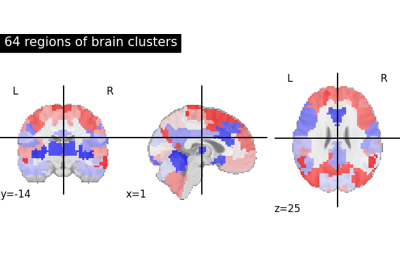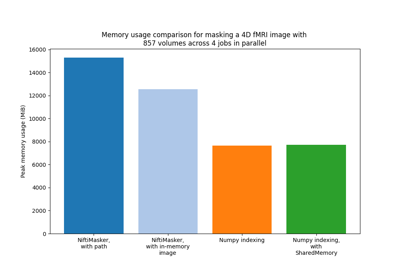Note
This page is a reference documentation. It only explains the function signature, and not how to use it. Please refer to the user guide for the big picture.
nilearn.datasets.fetch_atlas_basc_multiscale_2015¶
- nilearn.datasets.fetch_atlas_basc_multiscale_2015(data_dir=None, url=None, resume=True, verbose=1, resolution=7, version='sym')[source]¶
Download and load multiscale functional brain parcellations.
This Deterministic atlas includes group brain parcellations generated from resting-state functional magnetic resonance images from about 200 young healthy subjects.
Multiple resolutions (number of networks) are available, among 7, 12, 20, 36, 64, 122, 197, 325, 444. The brain parcellations have been generated using a method called bootstrap analysis of stable clusters called as BASC Bellec et al.[1], and the resolutions have been selected using a data-driven method called MSTEPS Bellec[2].
Note that two versions of the template are available, ‘sym’ or ‘asym’. The ‘asym’ type contains brain images that have been registered in the asymmetric version of the MNI brain template (reflecting that the brain is asymmetric), while the ‘sym’ type contains images registered in the symmetric version of the MNI template. The symmetric template has been forced to be symmetric anatomically, and is therefore ideally suited to study homotopic functional connections in fMRI: finding homotopic regions simply consists of flipping the x-axis of the template.
Added in Nilearn 0.2.3.
- Parameters:
- data_dir
pathlib.Pathorstror None, optional Path where data should be downloaded. By default, files are downloaded in a
nilearn_datafolder in the home directory of the user. See alsonilearn.datasets.utils.get_data_dirs.- url
stror None, default=None URL of file to download. Override download URL. Used for test only (or if you setup a mirror of the data).
- resume
bool, default=True Whether to resume download of a partly-downloaded file.
- verbose
boolorint, default=1 Verbosity level (
0orFalsemeans no message).- resolution
int, default=7 Number of networks in the dictionary. Valid resolutions available are {7, 12, 20, 36, 64, 122, 197, 325, 444}
- version{‘sym’, ‘asym’}, default=’sym’
Available versions are ‘sym’ or ‘asym’. By default all scales of brain parcellations of version ‘sym’ will be returned.
- data_dir
- Returns:
- data
sklearn.utils.Bunch Dictionary-like object, Keys are:
- maps:
str Path to Nifti file of the brain parcellation. Images have shape
(53, 64, 52)and contain consecutive integer values from 0 to the selected number of networks (scale).
- maps:
- ‘description’
str Description of the dataset.
- ‘description’
- lut
pandas.DataFrame Act as a look up table (lut) with at least columns ‘index’ and ‘name’. Formatted according to ‘dseg.tsv’ format from BIDS.
- lut
- ‘template’
str The standardized space of analysis in which the atlas results are provided. When known it should be a valid template name taken from the spaces described in the BIDS specification.
- ‘template’
- ‘atlas_type’
str Type of atlas. See Probabilistic atlas and Deterministic atlas.
- ‘atlas_type’
- data
Notes
If the dataset files are already present in the user’s Nilearn data directory, this fetcher will not re-download them. To force a fresh download, you can remove the existing dataset folder from your local Nilearn data directory.
For more details on how Nilearn stores datasets.
For more information on this dataset’s structure, see https://figshare.com/articles/dataset/Group_multiscale_functional_template_generated_with_BASC_on_the_Cambridge_sample/1285615
References
Examples using nilearn.datasets.fetch_atlas_basc_multiscale_2015¶

Visualizing multiscale functional brain parcellations
